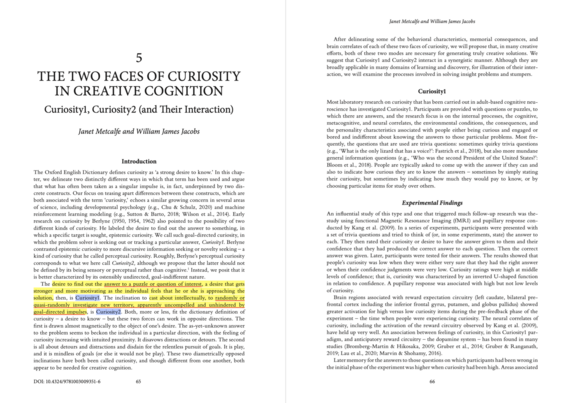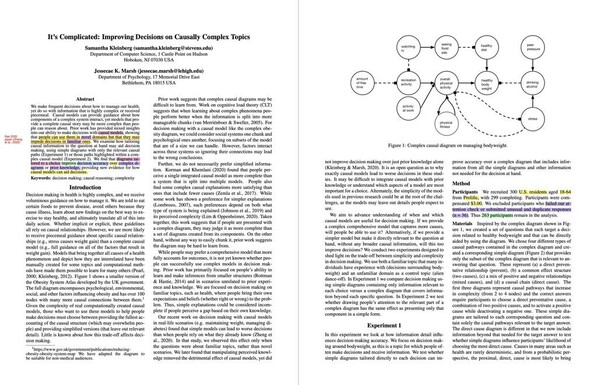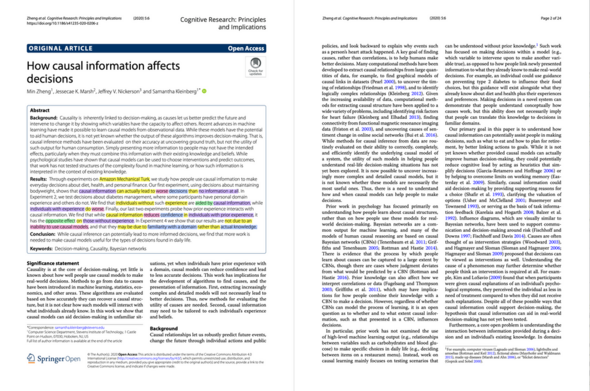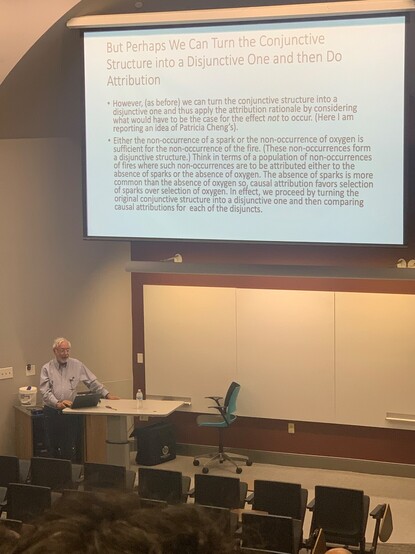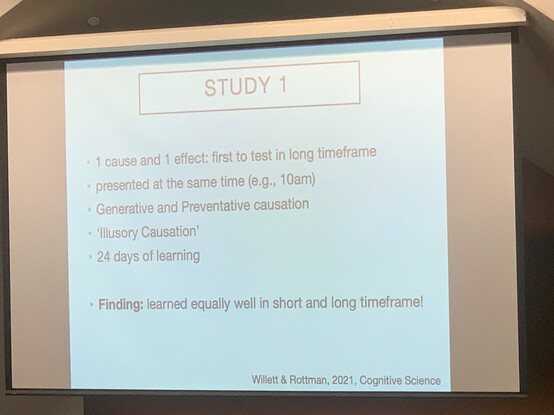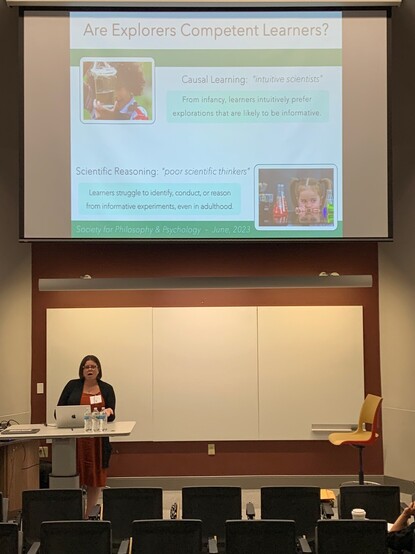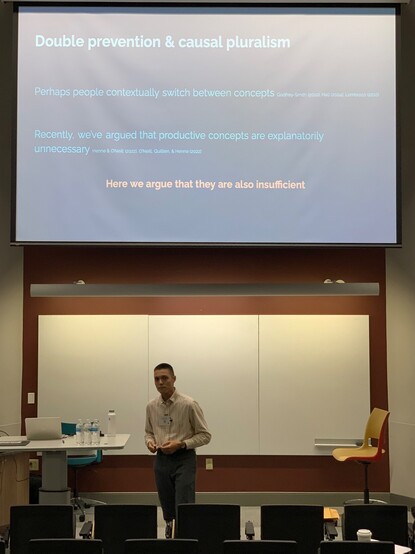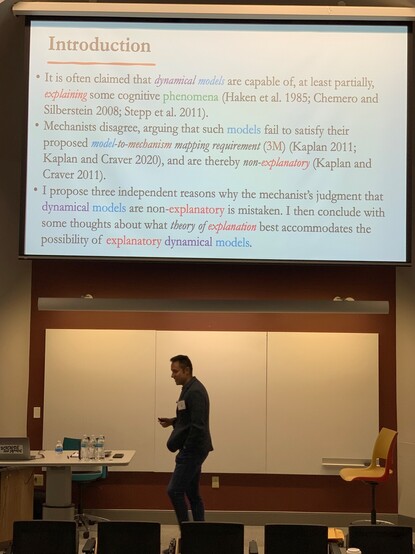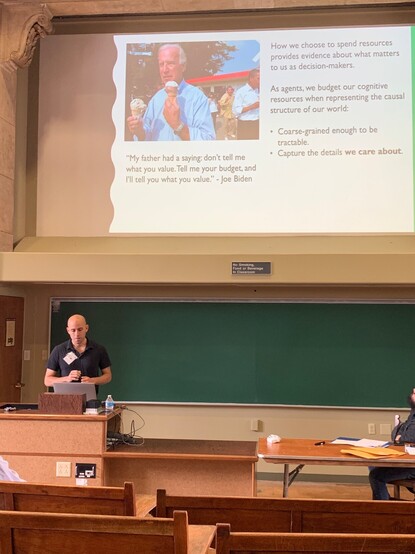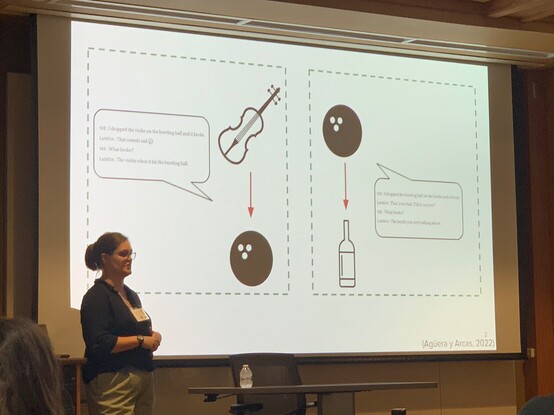naturepoker · @naturepoker
683 followers · 1342 posts · Server genomic.socialToday's find: "Narrative Science Reasoning, Representing and Knowing since 1800" is available fully as an open access PDF. Looking forward to reading through this one!
https://www.cambridge.org/core/books/narrative-science/C24469AE3BC2B8EEACF8DE743BB46614 #history #philsci
Mark Rubin · @MarkRubin
1841 followers · 1707 posts · Server fediscience.orgNew article from me:
“The replication crisis is less of a ‘crisis’ in the Lakatosian approach than it is in the Popperian and naïve methodological falsificationism approaches”
Substack: https://markrubin.substack.com/p/popper-lakatos-and-the-replication-crisis
Preprint: https://doi.org/10.31222/osf.io/2dz9s
#MetaScience
#MetaResearch
#ReplicationCrisis
#SociologyofScience
#ScienceofScience
#STS
@stsing
#PhilosophyOfScience
#PhilSci
@philosophyofscience
#philsci #philosophyofscience #sts #ScienceOfScience #sociologyofscience #replicationcrisis #metaresearch #metascience
Nick Byrd · @ByrdNick
901 followers · 534 posts · Server nerdculture.deDoes #curiosity refer to just one thing?
There seem to be two (related) notions:
Curiosity1: goal-directed information seeking — e.g., following a string of citations to find the source of a particular claim.
Curiosity2: exploratory information seeking — e.g., watching whatever explainer video is recommended next, even if it’s about a different question or topic.
Metcalfe & Jacobs: https://doi.org/10.4324/9781003009351-6
#curiosity #psychology #philmind #philsci #measurement #psychometrics
Alex Holcombe · @alexh
1716 followers · 1092 posts · Server fediscience.org"the 2023 Conference of the Australasian Association for the History, Philosophy and Social Studies of Science (AAHPSSS) will take place at the University of Sydney, Wednesday 29 November and Friday 1 December, 2023.
The call for papers is now open!"
https://aahpsss.net.au/cfp-aahpsss-2023-conference/ #hps #philosophy #philsci
EU Philosophy of Cosmology · @EU_phil_cosmo
13 followers · 18 posts · Server hcommons.social1) What does "dark matter" mean?
https://dansdarkmatters.wordpress.com/2023/07/21/dark-matter-dark-matter-wherefore-art-thou-dark-matter/
2) Are the dark matter and modified gravity concepts mutually exclusive?
https://www.sciencedirect.com/science/article/pii/S135521982030109X
3) How to interpret Janus-faced theories that are both a form of dark matter and a modification of gravity?
https://www.sciencedirect.com/science/article/pii/S1355219820301106
#HPS #philosophy #philsci #philosophyofphysics #philosophyofcosmology
#hps #philosophy #philsci #philosophyofphysics #PhilosophyOfCosmology
EU Philosophy of Cosmology · @EU_phil_cosmo
6 followers · 15 posts · Server hcommons.socialBonn's Heinrich Hertz Visiting Fellowship programme is up and running again. Well-paid fellowships to visit one of the largest groups in the history and philosophy of gravity, spacetime, cosmology and astrophysics.
https://history-and-philosophy-of-physics.com/heinrich-hertz-fellowship.html
#philosophy #philsci #philosophyofphysics #philosophyofcosmology
#philosophy #philsci #philosophyofphysics #PhilosophyOfCosmology
Utrecht Hist & Phil of Science · @UtrechtHPS
15 followers · 6 posts · Server akademienl.socialDr. Emily Sullivan is a philosopher of data and computer science, who will be an Assistant Professor ("Universitair Docent") for Philosophy of Science.
https://dailynous.com/2023/06/26/utrecht-hires-11-new-philosophers.
#philosophy #philsci #HPS #History #histsci
#philosophy #philsci #hps #History #histsci
Nick Byrd · @ByrdNick
882 followers · 490 posts · Server nerdculture.deMore insight from Samantha Kleinberg and colleagues:
Causal diagrams also improved accuracy more if they
- included decision-relevant causal info
- neither included nor drew attention to decision-IRrelevant info
That suggests ways to use causal diagrams more effectively!
#decisionscience #philsci #edu #criticalthinking #scicomm
Nick Byrd · @ByrdNick
882 followers · 490 posts · Server nerdculture.de🤔 "causal information at decision time can lead to less accurate choices in domains that relate to existing knowledge".
Possible explanations: (a) fluency effect or (b) expertise reversal effect.
https://doi.org/10.1186/s41235-020-0206-z
#PhilosophyOfScience #PhilSci #xPhi #Epistemology #Causation #DecisionScience #cogSci
#philosophyofscience #philsci #xPhi #epistemology #causation #decisionscience #cogsci
EU Philosophy of Cosmology · @EU_phil_cosmo
3 followers · 6 posts · Server hcommons.socialVery exciting news in the philosophy of physics space as the first edited collection of philosophy of astrophysics is out! The volume is open-access, so you can go and read it today
https://link.springer.com/book/10.1007/978-3-031-26618-8
The volume is edited by Vera Matarese, Siska De Baerdemaeker, Nora Mills Boyd and Kevin Heng. Their aim was to gather current research in the philosophy of astrophysics, provide a reference resource for scholars in the field and create an introduction for curious newcomers.
The editors discussed the volume and its goals in a podcast with philosopher Robinson Erhardt. A highly recommended watch. https://youtu.be/jw87gyCaZIo
The philosophy of astrophysics is concerned with answering normative questions about the scientific practice of astrophysics. There are three main themes this volume is concerned with. 1) Theory, Observation, and their Relation. 2) Models and Simulations. 3) Black Holes.
#philosophy #philsci #astrophysics #astronomy #philosophyofphysics #philosophyofcosmology
#philosophy #philsci #astrophysics #Astronomy #philosophyofphysics #PhilosophyOfCosmology
Kati Kish Bar-On · @kati_kish
24 followers · 25 posts · Server mathstodon.xyz🎉The third (and final!) paper from my Ph.D. dissertation is now out at @PhilSciJournal as 👀 First view article 👀 #philsci #histofscience #mathhistory
🧐Interested in how mathematical communities react to new ideas?
Read on:
(if you don't have 🔐, please pm me!) https://www.cambridge.org/core/journals/philosophy-of-science/article/abs/connecting-the-revolutionary-with-the-conventional-rethinking-the-differences-between-the-works-of-brouwer-heyting-and-weyl/9376F606893AEDB9AD887548C59D6099
#mathhistory #histofscience #philsci
EU Philosophy of Cosmology · @EU_phil_cosmo
2 followers · 4 posts · Server hcommons.socialThis is a useful website to assist in deciding to which philosophy journal one should submit their paper.
https://pjip.carrd.co
#philosophy #philsci
Utrecht Hist & Phil of Science · @UtrechtHPS
4 followers · 2 posts · Server akademienl.socialNot one but two PostDoc positions at Utrecht University @utrechtuniversity on the history and philosophy of physics or science, within Guido Bacciagaluppi's ERC project "Niels Bohr for the 21st century". There are less than two weeks left to apply.
https://www.uu.nl/en/organisation/working-at-utrecht-university/jobs/two-postdoc-positions-in-history-and-philosophy-of-physics-or-science-08-10-fte
#HPS #history #historyofscience #histsci #philosophyofphysics #philsci
#hps #History #historyofscience #histsci #philosophyofphysics #philsci
Nick Byrd · @ByrdNick
822 followers · 438 posts · Server nerdculture.deJim Woodward literally talked though “Some Reflections on Actual Causation and Causal Selection”
The slides were walls of text and the talk was Jim’s corresponding and unscripted thoughts.
You can find Jim’s lifetime of work topics like this on gScholar: https://scholar.google.com/citations?user=x0v5vhQAAAAJ&hl=en&oi=ao
#philsci #causation #psychology
Nick Byrd · @ByrdNick
822 followers · 437 posts · Server nerdculture.deBen Rottman: “The Accuracy of Causal Learning and Judgment from Experiences Gathered over Weeks”
Six decently-powered studies found some conditions under which shorter- and longer-term causal learning occurs.
Find/follow Ben on gScholar: https://scholar.google.com/citations?hl=en&user=BMIUsOgAAAAJ&view_op=list_works&sortby=pubdate
#philsci #causation #science #edu #memory #cogsci
Nick Byrd · @ByrdNick
821 followers · 424 posts · Server nerdculture.deCaren Walker presented "Children Consider Future Learning Goals During Information Search" with/for Liz Lapidow (who was sick, absent).
Puzzle: evidence is mixed about whether kids are "intuitive scientists" or bad at scientific thinking (controlling for variables).
Modified task suggested kids *can be* intuitive scientists when the task dissociates different goals that kids might have during the task.
Paper on gScholar: https://scholar.google.com/scholar?oi=bibs&hl=en&cluster=18137361289857062215
#DevPsych #cogsci #philsci #philmind #causation
Nick Byrd · @ByrdNick
821 followers · 423 posts · Server nerdculture.deKevin O’Neill presented great #xPhi/#cogSci studies of how people think of causation in cases of double prevention (i.e., A prevents B from preventing C from doing something).
Kevin, Paul Henne, Tadeg Quillien, Thomas Icard, & Felipe De Brigard devised three kinds of cases to understand people's thinking.
Gorgeous plots! But the team seems to admit they deviate from their model.
You can follow Kevin on PhilPapers: https://philpeople.org/profiles/kevin-o-neill
#xPhi #cogsci #causation #psychology #philsci #spp2023
Nick Byrd · @ByrdNick
819 followers · 422 posts · Server nerdculture.dePaul J. Kelly opened the "Reasoning & Explanation" session at #SPP2023 with "Dynamical Models, Scientific Understanding, and Explanatory Unification".
After some objections to accounts of the explanatoriness of explanatory models, Kelly refers to the notion of "model transfer" in which one model can explain multiple phenomena using the same "state space"—an idea that traces to Kitcher (1989).
Paul can be followed on PhilPeople: https://philpeople.org/profiles/paul-j-kelly
#spp2023 #philsci #metaphysics #epistemology #cogsci
Nick Byrd · @ByrdNick
819 followers · 420 posts · Server nerdculture.deIn the "Thinking about Social Groups" session of #SPP2023, David Kinney presented "Tell Me Your (Cognitive) Budget, and I’ll Tell You What You Value: ..." (in collaboration with Tania Lombrozo).
They tried to design stimuli that could test the degree to which people incorporate a representation of a problem, relevant, data, and values.
I didn't see a preprint of this project online, but Dr. Kinney's on gScholar: https://scholar.google.com/citations?user=9gK2xIoAAAAJ&hl=en&oi=ao
#spp2023 #probability #rationality #decisionscience #philsci #xPhi
Nick Byrd · @ByrdNick
818 followers · 415 posts · Server nerdculture.deIn the #ArtificialIntelligence session of #SPP2023, Celine Budding presents "Tacit Knowledge and Top-Down Experiments for Explaining How Large Language Models Work"
Dr. Budding proposes "We can conceptualize what #LLMs learn as ...tacit #knowledge".
Implications for how the systems work, allow for interventions on the systems, and provoke hypotheses and experiments.
Find/follow Celine's publications on gScholar: https://scholar.google.com/citations?user=M_sy5A0AAAAJ&hl=en&oi=ao
#artificialintelligence #spp2023 #LLMs #knowledge #ai #cs #compsci #philmind #philsci #psych

